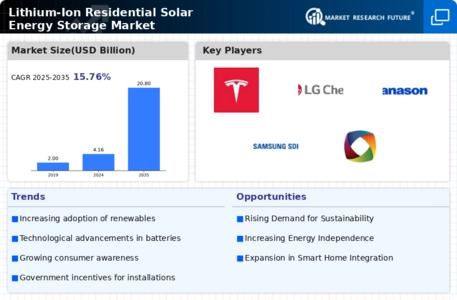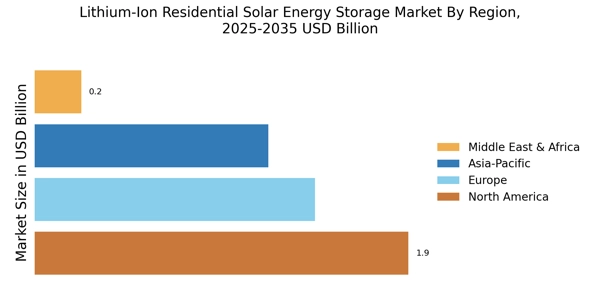Regulatory Support and Incentives
Regulatory frameworks and incentives play a crucial role in shaping the Lithium-Ion Residential Solar Energy Storage Market. Governments worldwide are implementing policies that promote the adoption of renewable energy technologies, including tax credits, rebates, and grants for solar energy systems. These incentives not only lower the initial investment costs for consumers but also encourage the integration of lithium-ion storage solutions. For example, certain regions have reported a 30% increase in installations due to favorable regulatory environments. As these supportive measures continue to evolve, they are expected to drive further growth in the Lithium-Ion Residential Solar Energy Storage Market, making it more accessible to a broader audience.
Integration of Smart Home Technologies
The integration of smart home technologies is emerging as a significant driver for the Lithium-Ion Residential Solar Energy Storage Market. As smart home devices become more prevalent, homeowners are increasingly looking for energy solutions that can seamlessly integrate with these technologies. Lithium-ion storage systems that offer compatibility with smart home platforms allow users to monitor and manage their energy consumption more effectively. This trend is supported by a growing market for smart home devices, which is projected to reach billions in revenue by the end of the decade. Consequently, the demand for lithium-ion residential solar energy storage solutions that can interface with smart technologies is likely to increase, further propelling the growth of the Lithium-Ion Residential Solar Energy Storage Market.
Growing Consumer Awareness of Sustainability
Consumer awareness regarding sustainability is a pivotal driver for the Lithium-Ion Residential Solar Energy Storage Market. As individuals become increasingly conscious of their carbon footprints, the demand for renewable energy solutions, particularly solar energy, is on the rise. Surveys indicate that a significant percentage of homeowners are willing to invest in solar energy systems that include lithium-ion storage to maximize energy efficiency and reduce reliance on fossil fuels. This shift in consumer behavior is likely to propel the market forward, as more households seek to adopt sustainable practices. The Lithium-Ion Residential Solar Energy Storage Market stands to benefit from this trend, as it aligns with the broader movement towards eco-friendly energy solutions.
Rising Electricity Costs and Energy Independence
The escalating costs of electricity are prompting consumers to seek alternative energy solutions, thereby driving the Lithium-Ion Residential Solar Energy Storage Market. As utility rates continue to rise, homeowners are increasingly motivated to invest in solar energy systems that include lithium-ion storage to achieve energy independence. This trend is particularly evident in areas where electricity prices have surged by over 15% in recent years. By utilizing solar energy and storage, consumers can mitigate the impact of rising costs and gain greater control over their energy consumption. This growing desire for energy autonomy is likely to bolster the demand for lithium-ion storage solutions within the Lithium-Ion Residential Solar Energy Storage Market.
Technological Advancements in Battery Efficiency
The Lithium-Ion Residential Solar Energy Storage Market is experiencing rapid advancements in battery technology, which significantly enhance energy storage capabilities. Innovations such as improved energy density and faster charging times are becoming commonplace. For instance, the introduction of solid-state batteries is anticipated to revolutionize the market by offering higher safety and efficiency. As these technologies mature, they are likely to reduce costs and increase the lifespan of storage systems. This trend is supported by a projected compound annual growth rate (CAGR) of over 20% in the battery technology sector, indicating a robust future for the Lithium-Ion Residential Solar Energy Storage Market. Consequently, consumers are more inclined to invest in solar energy solutions that incorporate these advanced storage systems.


















